Global Climate Change and Its Impact on Developing Countries Essay
VerifiedAdded on 2022/08/19
|10
|1853
|8
Essay
AI Summary
This essay addresses the critical issue of global climate change, focusing on its impact on Papua New Guinea (PNG). The paper explores the role of greenhouse gases, deforestation, and population growth in exacerbating climate change effects. It highlights the problems faced by developing countries, particularly in terms of altered rainfall patterns, agricultural impacts, and food security challenges. The essay also delves into the political and economic consequences of climate change, including the need for governmental regulations. Furthermore, it proposes solutions such as reforestation, alternative energy sources, and population control to mitigate greenhouse gas emissions and combat the adverse effects of climate change. The essay draws on various studies to support its arguments, offering a comprehensive overview of the issue and potential strategies for addressing it.

Running head: GLOBAL CLIMATE CHANGE AND ITS IMPACT
Global Climate Change and its Impact
Name of the Student
Name of the University
Author Note
Global Climate Change and its Impact
Name of the Student
Name of the University
Author Note
Paraphrase This Document
Need a fresh take? Get an instant paraphrase of this document with our AI Paraphraser
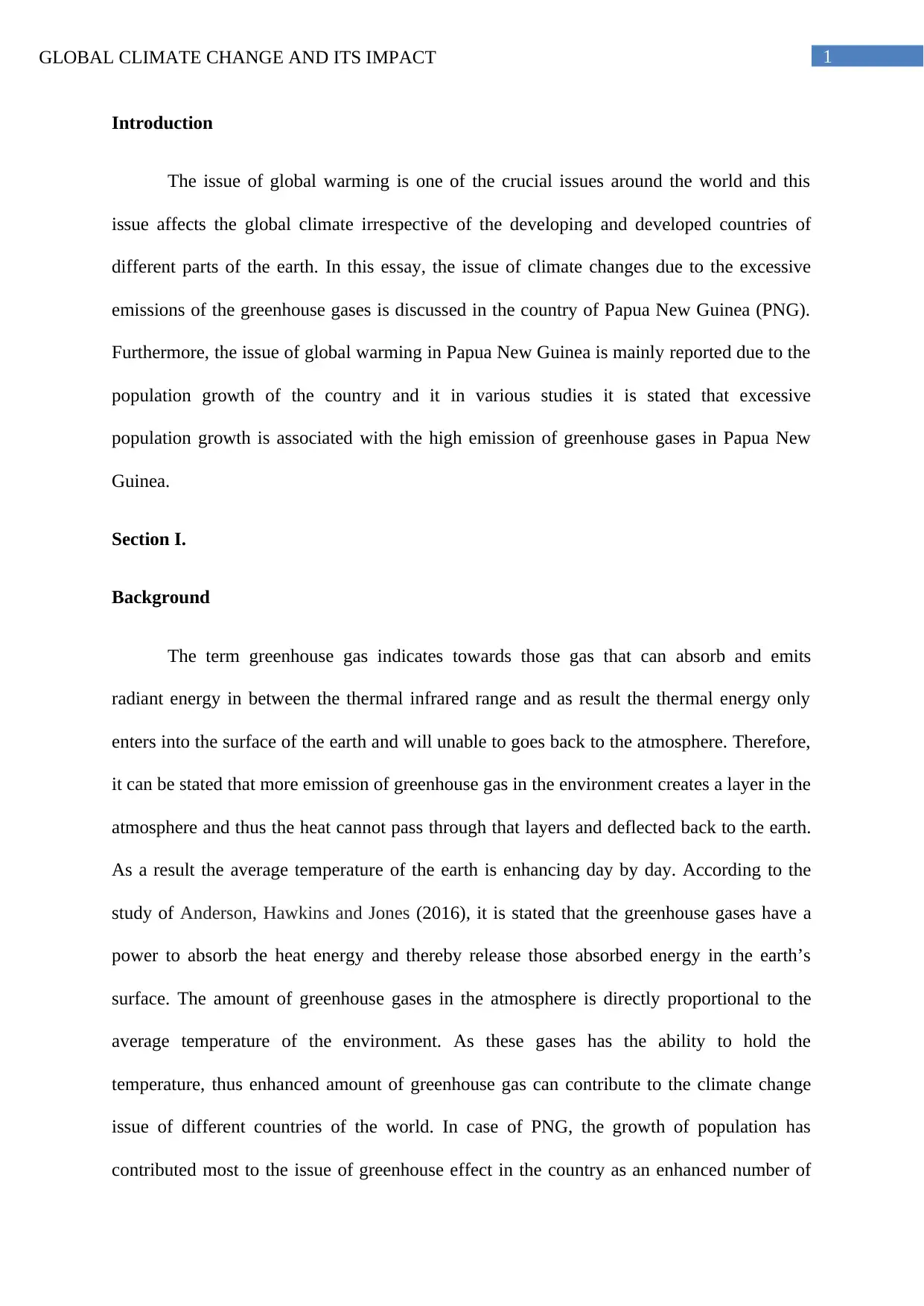
1GLOBAL CLIMATE CHANGE AND ITS IMPACT
Introduction
The issue of global warming is one of the crucial issues around the world and this
issue affects the global climate irrespective of the developing and developed countries of
different parts of the earth. In this essay, the issue of climate changes due to the excessive
emissions of the greenhouse gases is discussed in the country of Papua New Guinea (PNG).
Furthermore, the issue of global warming in Papua New Guinea is mainly reported due to the
population growth of the country and it in various studies it is stated that excessive
population growth is associated with the high emission of greenhouse gases in Papua New
Guinea.
Section I.
Background
The term greenhouse gas indicates towards those gas that can absorb and emits
radiant energy in between the thermal infrared range and as result the thermal energy only
enters into the surface of the earth and will unable to goes back to the atmosphere. Therefore,
it can be stated that more emission of greenhouse gas in the environment creates a layer in the
atmosphere and thus the heat cannot pass through that layers and deflected back to the earth.
As a result the average temperature of the earth is enhancing day by day. According to the
study of Anderson, Hawkins and Jones (2016), it is stated that the greenhouse gases have a
power to absorb the heat energy and thereby release those absorbed energy in the earth’s
surface. The amount of greenhouse gases in the atmosphere is directly proportional to the
average temperature of the environment. As these gases has the ability to hold the
temperature, thus enhanced amount of greenhouse gas can contribute to the climate change
issue of different countries of the world. In case of PNG, the growth of population has
contributed most to the issue of greenhouse effect in the country as an enhanced number of
Introduction
The issue of global warming is one of the crucial issues around the world and this
issue affects the global climate irrespective of the developing and developed countries of
different parts of the earth. In this essay, the issue of climate changes due to the excessive
emissions of the greenhouse gases is discussed in the country of Papua New Guinea (PNG).
Furthermore, the issue of global warming in Papua New Guinea is mainly reported due to the
population growth of the country and it in various studies it is stated that excessive
population growth is associated with the high emission of greenhouse gases in Papua New
Guinea.
Section I.
Background
The term greenhouse gas indicates towards those gas that can absorb and emits
radiant energy in between the thermal infrared range and as result the thermal energy only
enters into the surface of the earth and will unable to goes back to the atmosphere. Therefore,
it can be stated that more emission of greenhouse gas in the environment creates a layer in the
atmosphere and thus the heat cannot pass through that layers and deflected back to the earth.
As a result the average temperature of the earth is enhancing day by day. According to the
study of Anderson, Hawkins and Jones (2016), it is stated that the greenhouse gases have a
power to absorb the heat energy and thereby release those absorbed energy in the earth’s
surface. The amount of greenhouse gases in the atmosphere is directly proportional to the
average temperature of the environment. As these gases has the ability to hold the
temperature, thus enhanced amount of greenhouse gas can contribute to the climate change
issue of different countries of the world. In case of PNG, the growth of population has
contributed most to the issue of greenhouse effect in the country as an enhanced number of
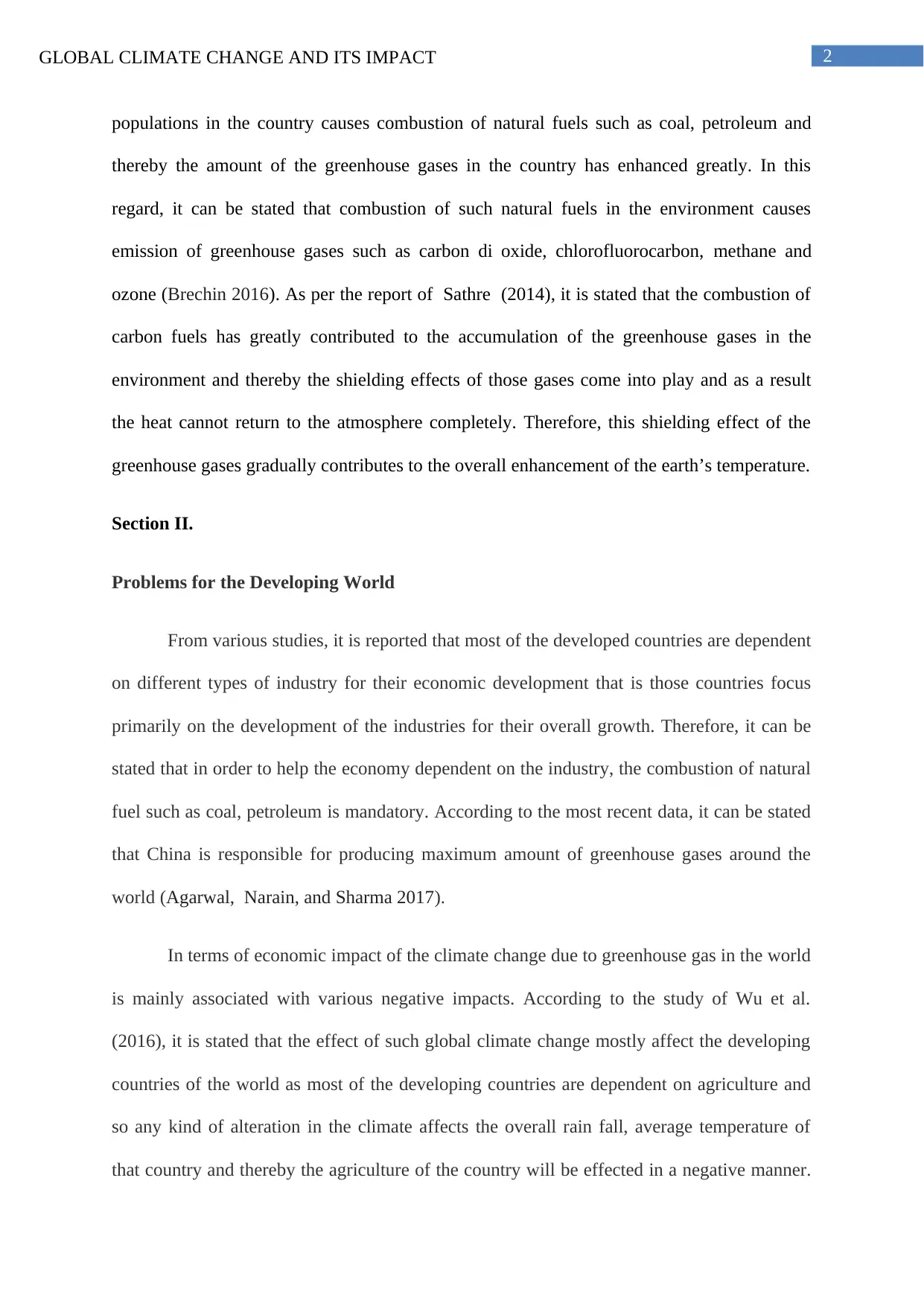
2GLOBAL CLIMATE CHANGE AND ITS IMPACT
populations in the country causes combustion of natural fuels such as coal, petroleum and
thereby the amount of the greenhouse gases in the country has enhanced greatly. In this
regard, it can be stated that combustion of such natural fuels in the environment causes
emission of greenhouse gases such as carbon di oxide, chlorofluorocarbon, methane and
ozone (Brechin 2016). As per the report of Sathre (2014), it is stated that the combustion of
carbon fuels has greatly contributed to the accumulation of the greenhouse gases in the
environment and thereby the shielding effects of those gases come into play and as a result
the heat cannot return to the atmosphere completely. Therefore, this shielding effect of the
greenhouse gases gradually contributes to the overall enhancement of the earth’s temperature.
Section II.
Problems for the Developing World
From various studies, it is reported that most of the developed countries are dependent
on different types of industry for their economic development that is those countries focus
primarily on the development of the industries for their overall growth. Therefore, it can be
stated that in order to help the economy dependent on the industry, the combustion of natural
fuel such as coal, petroleum is mandatory. According to the most recent data, it can be stated
that China is responsible for producing maximum amount of greenhouse gases around the
world (Agarwal, Narain, and Sharma 2017).
In terms of economic impact of the climate change due to greenhouse gas in the world
is mainly associated with various negative impacts. According to the study of Wu et al.
(2016), it is stated that the effect of such global climate change mostly affect the developing
countries of the world as most of the developing countries are dependent on agriculture and
so any kind of alteration in the climate affects the overall rain fall, average temperature of
that country and thereby the agriculture of the country will be effected in a negative manner.
populations in the country causes combustion of natural fuels such as coal, petroleum and
thereby the amount of the greenhouse gases in the country has enhanced greatly. In this
regard, it can be stated that combustion of such natural fuels in the environment causes
emission of greenhouse gases such as carbon di oxide, chlorofluorocarbon, methane and
ozone (Brechin 2016). As per the report of Sathre (2014), it is stated that the combustion of
carbon fuels has greatly contributed to the accumulation of the greenhouse gases in the
environment and thereby the shielding effects of those gases come into play and as a result
the heat cannot return to the atmosphere completely. Therefore, this shielding effect of the
greenhouse gases gradually contributes to the overall enhancement of the earth’s temperature.
Section II.
Problems for the Developing World
From various studies, it is reported that most of the developed countries are dependent
on different types of industry for their economic development that is those countries focus
primarily on the development of the industries for their overall growth. Therefore, it can be
stated that in order to help the economy dependent on the industry, the combustion of natural
fuel such as coal, petroleum is mandatory. According to the most recent data, it can be stated
that China is responsible for producing maximum amount of greenhouse gases around the
world (Agarwal, Narain, and Sharma 2017).
In terms of economic impact of the climate change due to greenhouse gas in the world
is mainly associated with various negative impacts. According to the study of Wu et al.
(2016), it is stated that the effect of such global climate change mostly affect the developing
countries of the world as most of the developing countries are dependent on agriculture and
so any kind of alteration in the climate affects the overall rain fall, average temperature of
that country and thereby the agriculture of the country will be effected in a negative manner.
⊘ This is a preview!⊘
Do you want full access?
Subscribe today to unlock all pages.

Trusted by 1+ million students worldwide
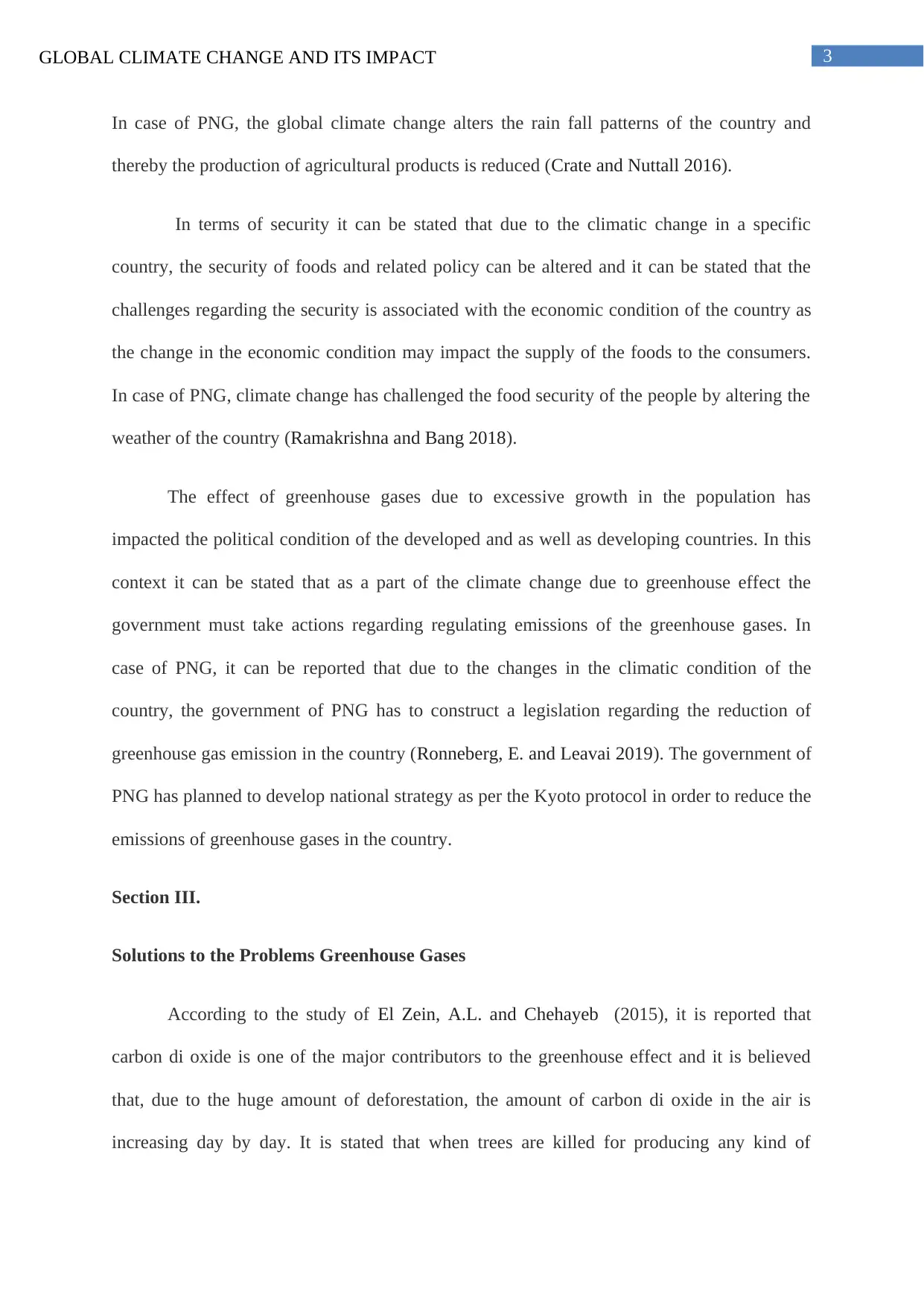
3GLOBAL CLIMATE CHANGE AND ITS IMPACT
In case of PNG, the global climate change alters the rain fall patterns of the country and
thereby the production of agricultural products is reduced (Crate and Nuttall 2016).
In terms of security it can be stated that due to the climatic change in a specific
country, the security of foods and related policy can be altered and it can be stated that the
challenges regarding the security is associated with the economic condition of the country as
the change in the economic condition may impact the supply of the foods to the consumers.
In case of PNG, climate change has challenged the food security of the people by altering the
weather of the country (Ramakrishna and Bang 2018).
The effect of greenhouse gases due to excessive growth in the population has
impacted the political condition of the developed and as well as developing countries. In this
context it can be stated that as a part of the climate change due to greenhouse effect the
government must take actions regarding regulating emissions of the greenhouse gases. In
case of PNG, it can be reported that due to the changes in the climatic condition of the
country, the government of PNG has to construct a legislation regarding the reduction of
greenhouse gas emission in the country (Ronneberg, E. and Leavai 2019). The government of
PNG has planned to develop national strategy as per the Kyoto protocol in order to reduce the
emissions of greenhouse gases in the country.
Section III.
Solutions to the Problems Greenhouse Gases
According to the study of El Zein, A.L. and Chehayeb (2015), it is reported that
carbon di oxide is one of the major contributors to the greenhouse effect and it is believed
that, due to the huge amount of deforestation, the amount of carbon di oxide in the air is
increasing day by day. It is stated that when trees are killed for producing any kind of
In case of PNG, the global climate change alters the rain fall patterns of the country and
thereby the production of agricultural products is reduced (Crate and Nuttall 2016).
In terms of security it can be stated that due to the climatic change in a specific
country, the security of foods and related policy can be altered and it can be stated that the
challenges regarding the security is associated with the economic condition of the country as
the change in the economic condition may impact the supply of the foods to the consumers.
In case of PNG, climate change has challenged the food security of the people by altering the
weather of the country (Ramakrishna and Bang 2018).
The effect of greenhouse gases due to excessive growth in the population has
impacted the political condition of the developed and as well as developing countries. In this
context it can be stated that as a part of the climate change due to greenhouse effect the
government must take actions regarding regulating emissions of the greenhouse gases. In
case of PNG, it can be reported that due to the changes in the climatic condition of the
country, the government of PNG has to construct a legislation regarding the reduction of
greenhouse gas emission in the country (Ronneberg, E. and Leavai 2019). The government of
PNG has planned to develop national strategy as per the Kyoto protocol in order to reduce the
emissions of greenhouse gases in the country.
Section III.
Solutions to the Problems Greenhouse Gases
According to the study of El Zein, A.L. and Chehayeb (2015), it is reported that
carbon di oxide is one of the major contributors to the greenhouse effect and it is believed
that, due to the huge amount of deforestation, the amount of carbon di oxide in the air is
increasing day by day. It is stated that when trees are killed for producing any kind of
Paraphrase This Document
Need a fresh take? Get an instant paraphrase of this document with our AI Paraphraser
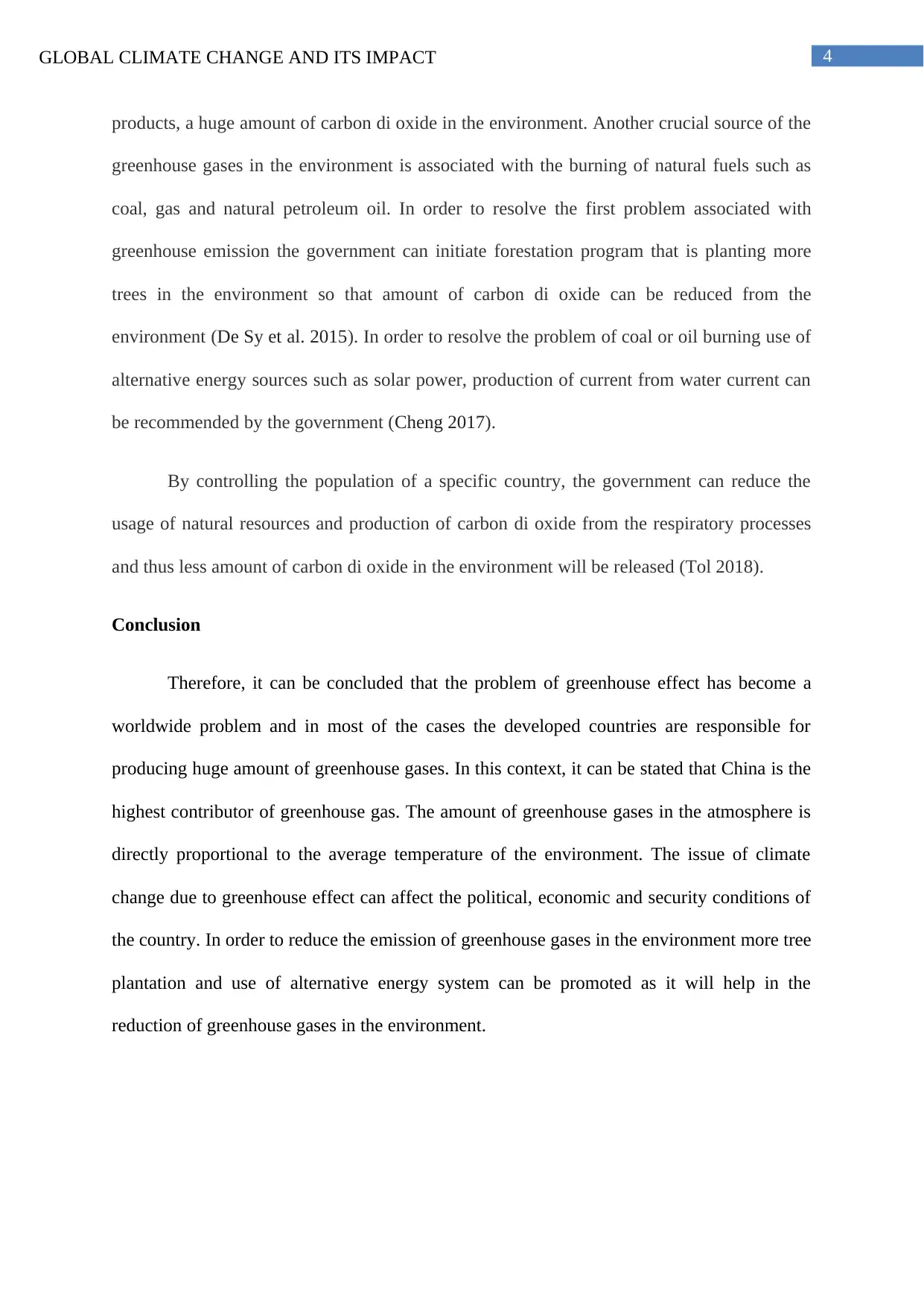
4GLOBAL CLIMATE CHANGE AND ITS IMPACT
products, a huge amount of carbon di oxide in the environment. Another crucial source of the
greenhouse gases in the environment is associated with the burning of natural fuels such as
coal, gas and natural petroleum oil. In order to resolve the first problem associated with
greenhouse emission the government can initiate forestation program that is planting more
trees in the environment so that amount of carbon di oxide can be reduced from the
environment (De Sy et al. 2015). In order to resolve the problem of coal or oil burning use of
alternative energy sources such as solar power, production of current from water current can
be recommended by the government (Cheng 2017).
By controlling the population of a specific country, the government can reduce the
usage of natural resources and production of carbon di oxide from the respiratory processes
and thus less amount of carbon di oxide in the environment will be released (Tol 2018).
Conclusion
Therefore, it can be concluded that the problem of greenhouse effect has become a
worldwide problem and in most of the cases the developed countries are responsible for
producing huge amount of greenhouse gases. In this context, it can be stated that China is the
highest contributor of greenhouse gas. The amount of greenhouse gases in the atmosphere is
directly proportional to the average temperature of the environment. The issue of climate
change due to greenhouse effect can affect the political, economic and security conditions of
the country. In order to reduce the emission of greenhouse gases in the environment more tree
plantation and use of alternative energy system can be promoted as it will help in the
reduction of greenhouse gases in the environment.
products, a huge amount of carbon di oxide in the environment. Another crucial source of the
greenhouse gases in the environment is associated with the burning of natural fuels such as
coal, gas and natural petroleum oil. In order to resolve the first problem associated with
greenhouse emission the government can initiate forestation program that is planting more
trees in the environment so that amount of carbon di oxide can be reduced from the
environment (De Sy et al. 2015). In order to resolve the problem of coal or oil burning use of
alternative energy sources such as solar power, production of current from water current can
be recommended by the government (Cheng 2017).
By controlling the population of a specific country, the government can reduce the
usage of natural resources and production of carbon di oxide from the respiratory processes
and thus less amount of carbon di oxide in the environment will be released (Tol 2018).
Conclusion
Therefore, it can be concluded that the problem of greenhouse effect has become a
worldwide problem and in most of the cases the developed countries are responsible for
producing huge amount of greenhouse gases. In this context, it can be stated that China is the
highest contributor of greenhouse gas. The amount of greenhouse gases in the atmosphere is
directly proportional to the average temperature of the environment. The issue of climate
change due to greenhouse effect can affect the political, economic and security conditions of
the country. In order to reduce the emission of greenhouse gases in the environment more tree
plantation and use of alternative energy system can be promoted as it will help in the
reduction of greenhouse gases in the environment.
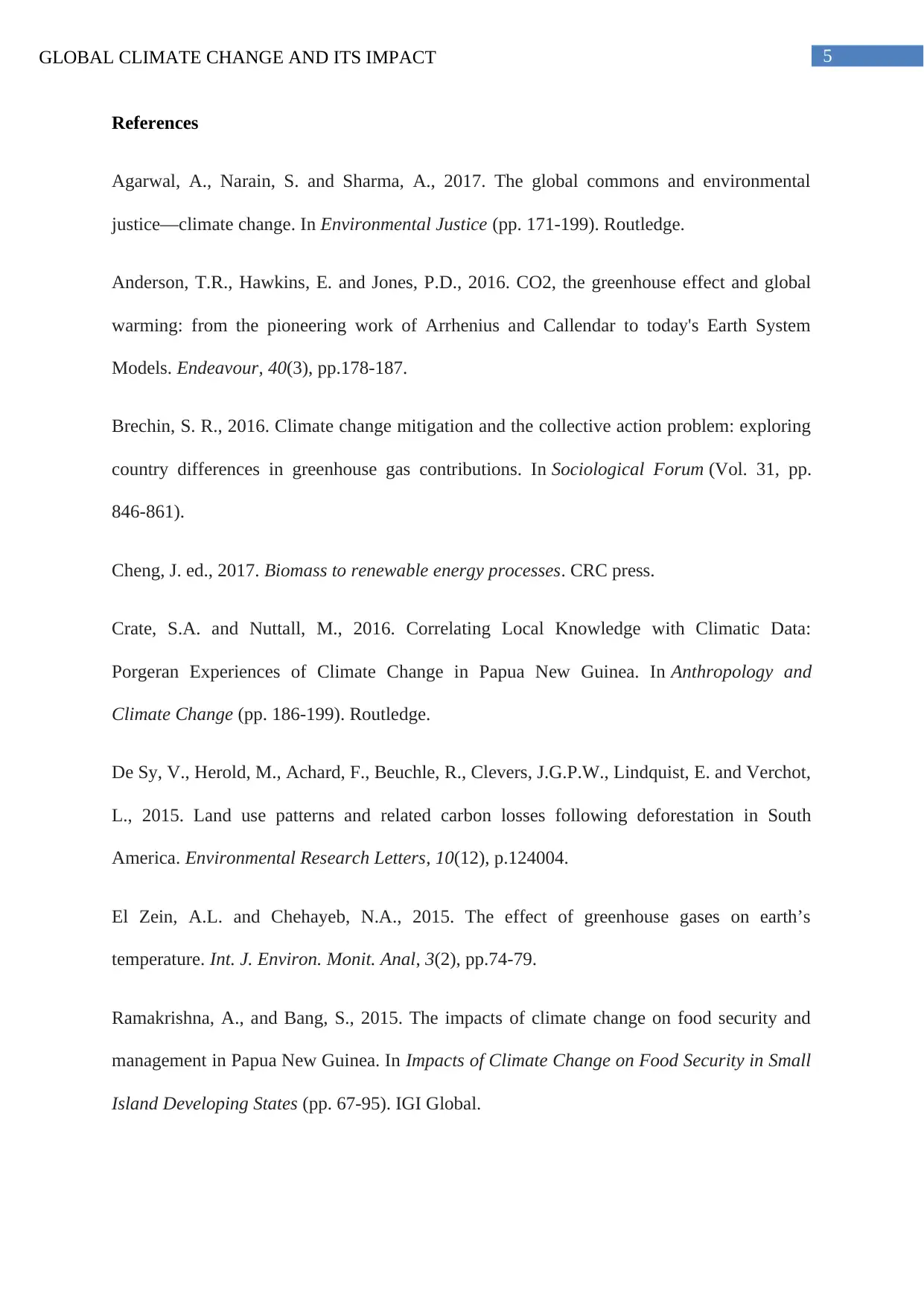
5GLOBAL CLIMATE CHANGE AND ITS IMPACT
References
Agarwal, A., Narain, S. and Sharma, A., 2017. The global commons and environmental
justice—climate change. In Environmental Justice (pp. 171-199). Routledge.
Anderson, T.R., Hawkins, E. and Jones, P.D., 2016. CO2, the greenhouse effect and global
warming: from the pioneering work of Arrhenius and Callendar to today's Earth System
Models. Endeavour, 40(3), pp.178-187.
Brechin, S. R., 2016. Climate change mitigation and the collective action problem: exploring
country differences in greenhouse gas contributions. In Sociological Forum (Vol. 31, pp.
846-861).
Cheng, J. ed., 2017. Biomass to renewable energy processes. CRC press.
Crate, S.A. and Nuttall, M., 2016. Correlating Local Knowledge with Climatic Data:
Porgeran Experiences of Climate Change in Papua New Guinea. In Anthropology and
Climate Change (pp. 186-199). Routledge.
De Sy, V., Herold, M., Achard, F., Beuchle, R., Clevers, J.G.P.W., Lindquist, E. and Verchot,
L., 2015. Land use patterns and related carbon losses following deforestation in South
America. Environmental Research Letters, 10(12), p.124004.
El Zein, A.L. and Chehayeb, N.A., 2015. The effect of greenhouse gases on earth’s
temperature. Int. J. Environ. Monit. Anal, 3(2), pp.74-79.
Ramakrishna, A., and Bang, S., 2015. The impacts of climate change on food security and
management in Papua New Guinea. In Impacts of Climate Change on Food Security in Small
Island Developing States (pp. 67-95). IGI Global.
References
Agarwal, A., Narain, S. and Sharma, A., 2017. The global commons and environmental
justice—climate change. In Environmental Justice (pp. 171-199). Routledge.
Anderson, T.R., Hawkins, E. and Jones, P.D., 2016. CO2, the greenhouse effect and global
warming: from the pioneering work of Arrhenius and Callendar to today's Earth System
Models. Endeavour, 40(3), pp.178-187.
Brechin, S. R., 2016. Climate change mitigation and the collective action problem: exploring
country differences in greenhouse gas contributions. In Sociological Forum (Vol. 31, pp.
846-861).
Cheng, J. ed., 2017. Biomass to renewable energy processes. CRC press.
Crate, S.A. and Nuttall, M., 2016. Correlating Local Knowledge with Climatic Data:
Porgeran Experiences of Climate Change in Papua New Guinea. In Anthropology and
Climate Change (pp. 186-199). Routledge.
De Sy, V., Herold, M., Achard, F., Beuchle, R., Clevers, J.G.P.W., Lindquist, E. and Verchot,
L., 2015. Land use patterns and related carbon losses following deforestation in South
America. Environmental Research Letters, 10(12), p.124004.
El Zein, A.L. and Chehayeb, N.A., 2015. The effect of greenhouse gases on earth’s
temperature. Int. J. Environ. Monit. Anal, 3(2), pp.74-79.
Ramakrishna, A., and Bang, S., 2015. The impacts of climate change on food security and
management in Papua New Guinea. In Impacts of Climate Change on Food Security in Small
Island Developing States (pp. 67-95). IGI Global.
⊘ This is a preview!⊘
Do you want full access?
Subscribe today to unlock all pages.

Trusted by 1+ million students worldwide
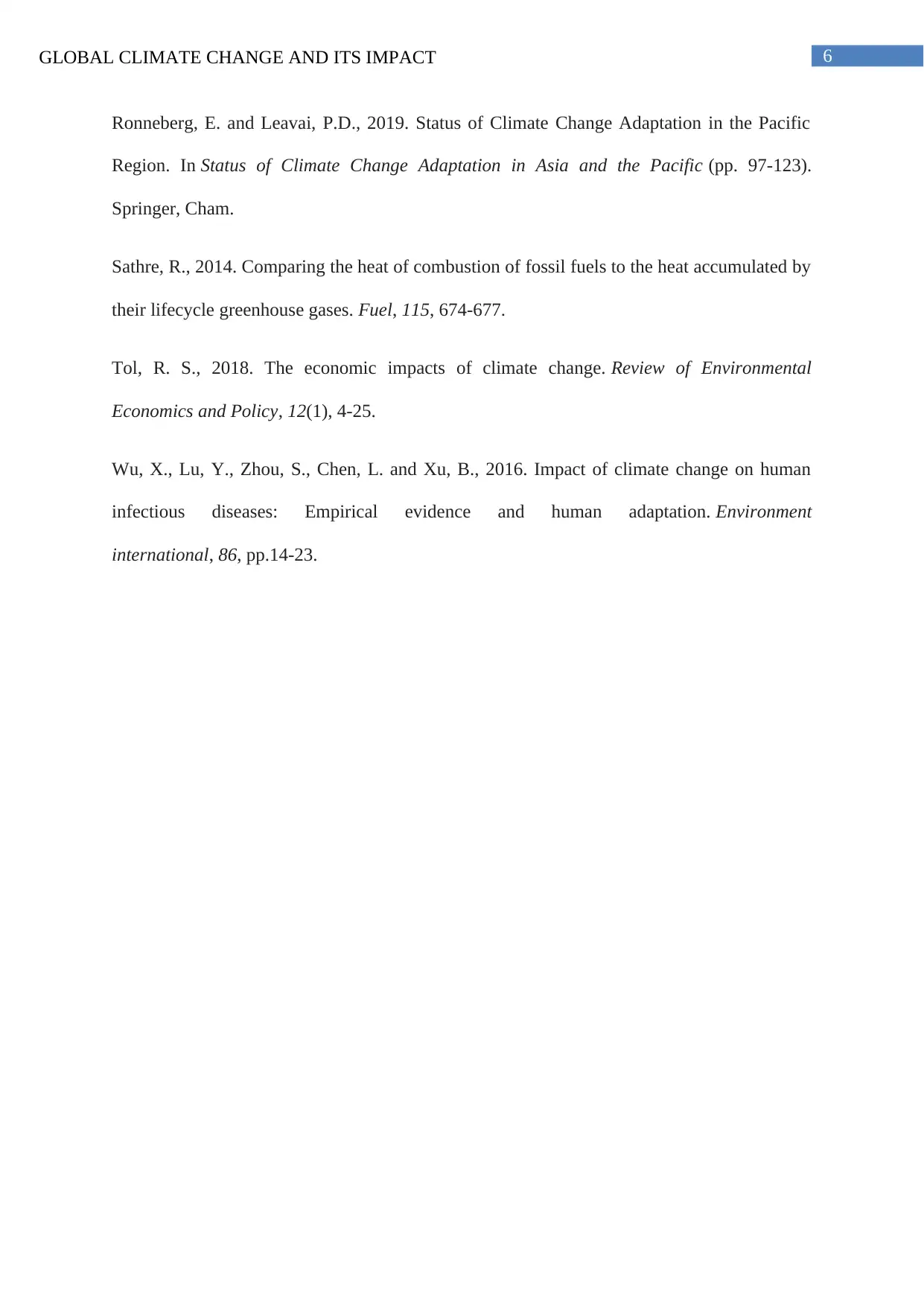
6GLOBAL CLIMATE CHANGE AND ITS IMPACT
Ronneberg, E. and Leavai, P.D., 2019. Status of Climate Change Adaptation in the Pacific
Region. In Status of Climate Change Adaptation in Asia and the Pacific (pp. 97-123).
Springer, Cham.
Sathre, R., 2014. Comparing the heat of combustion of fossil fuels to the heat accumulated by
their lifecycle greenhouse gases. Fuel, 115, 674-677.
Tol, R. S., 2018. The economic impacts of climate change. Review of Environmental
Economics and Policy, 12(1), 4-25.
Wu, X., Lu, Y., Zhou, S., Chen, L. and Xu, B., 2016. Impact of climate change on human
infectious diseases: Empirical evidence and human adaptation. Environment
international, 86, pp.14-23.
Ronneberg, E. and Leavai, P.D., 2019. Status of Climate Change Adaptation in the Pacific
Region. In Status of Climate Change Adaptation in Asia and the Pacific (pp. 97-123).
Springer, Cham.
Sathre, R., 2014. Comparing the heat of combustion of fossil fuels to the heat accumulated by
their lifecycle greenhouse gases. Fuel, 115, 674-677.
Tol, R. S., 2018. The economic impacts of climate change. Review of Environmental
Economics and Policy, 12(1), 4-25.
Wu, X., Lu, Y., Zhou, S., Chen, L. and Xu, B., 2016. Impact of climate change on human
infectious diseases: Empirical evidence and human adaptation. Environment
international, 86, pp.14-23.
Paraphrase This Document
Need a fresh take? Get an instant paraphrase of this document with our AI Paraphraser

7GLOBAL CLIMATE CHANGE AND ITS IMPACT

8GLOBAL CLIMATE CHANGE AND ITS IMPACT
⊘ This is a preview!⊘
Do you want full access?
Subscribe today to unlock all pages.

Trusted by 1+ million students worldwide

9GLOBAL CLIMATE CHANGE AND ITS IMPACT
1 out of 10
Related Documents
Your All-in-One AI-Powered Toolkit for Academic Success.
+13062052269
info@desklib.com
Available 24*7 on WhatsApp / Email
![[object Object]](/_next/static/media/star-bottom.7253800d.svg)
Unlock your academic potential
Copyright © 2020–2026 A2Z Services. All Rights Reserved. Developed and managed by ZUCOL.




